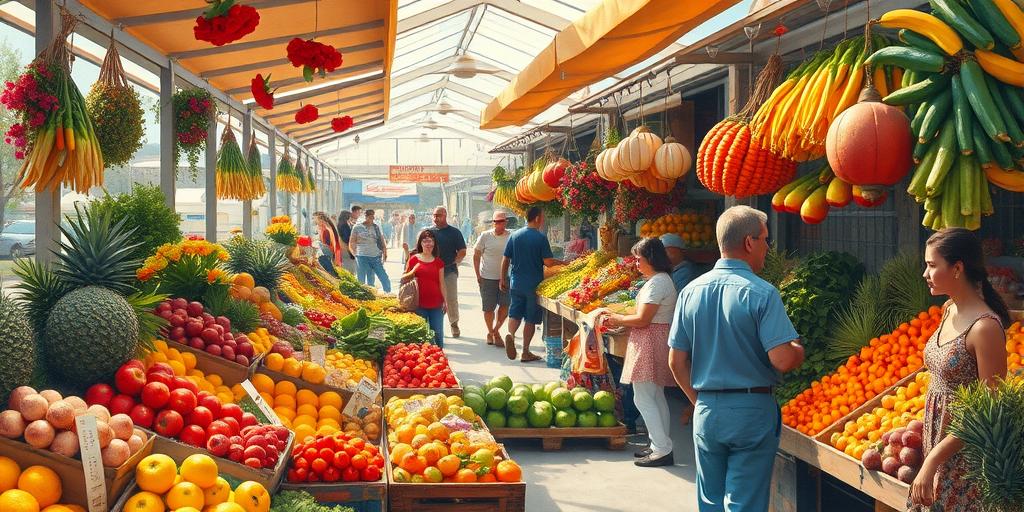Have you ever felt that nagging feeling that you could be doing more for the planet? That the food on your plate has a story, and that story isn't always a happy one? I felt that way for years, caught in the fast-paced cycle of supermarket shopping, unaware of the environmental impact and social implications of my food choices. But then came 2025, the year I decided to change everything and embark on a journey to support sustainable food, beginning with buying local. It was a transformative experience, and I'm here to share it with you, because this journey is one we can all take together! Let's delve into the details of why I chose local and the impact it had on my life.
The Allure of Local Food Systems
My decision to support local food systems wasn't a sudden epiphany, but rather the culmination of years of slowly growing awareness. I began researching the environmental impact of industrial agriculture and the vast distances our food travels. The images of water pollution, soil degradation, and carbon emissions from long-distance transportation were sobering. It became crystal clear that our current food system is fundamentally unsustainable. Choosing local was a direct step towards rectifying this. The benefits went far beyond just environmental protection, though. Think about the freshness—the explosion of flavor from a tomato picked just hours before it landed on your plate! That's the magic of local food, and an experience every foodie should have. That's why terms like 'farm-to-table' and 'locally sourced' have become so popular; people are starting to realize the difference. But the impact is far bigger than just taste.
Economic Impact
When you support local food systems, you directly support your local economy. By buying locally sourced products, you are contributing to the income of local farmers and food producers. This fosters economic growth within your community, creating jobs and strengthening the local economy in a profound way. It is a powerful way to invest in local entrepreneurs and ensure the financial stability of smaller, independent farms and businesses. This is crucial, as small farms are the backbone of sustainable agriculture. Supporting local helps to maintain the viability of small farms and keeps them competing against large corporations and their less sustainable practices. This contributes directly to sustaining livelihoods within the community. A vibrant and diversified local food system is also more resilient to external shocks such as climate change or economic crises.
Environmental Protection
Locally sourced food dramatically reduces the environmental footprint associated with food production and transportation. The carbon emissions related to shipping food across continents are immense. Opting for products grown nearby drastically cuts down on this carbon footprint. Less transportation also translates to a reduction in greenhouse gas emissions, air and water pollution, and dependence on fossil fuels. Local farming practices frequently utilize techniques that are gentler on the environment, such as crop rotation and reduced pesticide use. Buying local is a significant contribution to the fight against climate change and helps protect the environment.
From Supermarket Shelves to Farmers' Markets
The transition from supermarket shopping to sourcing my food locally was gradual but surprisingly easy. The most significant change was my shopping habits. My local farmers' market became my weekly pilgrimage, and it's far more than just shopping. It's a place to connect with the producers who grow your food, to learn about sustainable farming practices, and build a relationship with your community. Learning about the stories of the food, who grew it, and the care they put into their work has become a special part of my week. Many markets also offer seasonal and organically produced food, ensuring quality that is simply hard to find at the supermarket.
Finding Your Local Food Sources
Finding local food sources might seem daunting, but it's actually easier than you think. Start by searching online for local farmers' markets or community-supported agriculture (CSA) programs. Many cities also have online directories that list local farms and food producers. Check online for 'sustainable food near me', ‘farmers’ markets near me', or even 'local food delivery near me' to find options best suited to your lifestyle. Don't underestimate the power of word-of-mouth; ask your friends and neighbors about their favorite local food sources. You might be surprised at what you discover in your community!
Embracing the Change: A Sustainable Food Lifestyle
Making the shift to a more sustainable food lifestyle is not just about the food itself. It's about building a relationship with nature, with our communities, and with ourselves. It's about consuming with intention. It's about fostering a deeper understanding of where our food comes from and the implications of our choices. This awareness extends beyond just purchasing decisions; it informs conscious cooking, minimizing food waste, and choosing recipes that celebrate the bounty of seasonal, local produce. It's about a philosophy of life in harmony with our planet.
Beyond the Plate: The Ripple Effect
The ripple effect of my journey to support sustainable food has been truly profound. It's not only changed how I consume food but also how I interact with my environment and the people in my community. This journey has brought a sense of purpose, making me feel like I'm actively participating in creating a more sustainable future. I encourage you to make this journey as well; it is truly transformative and can significantly impact both your individual wellbeing and the wider world. Our food system has the power to reshape our planet – we need to make it sustainable!
Start your journey today. Find a local farmers' market, connect with your community, and taste the difference! You won't regret it.









